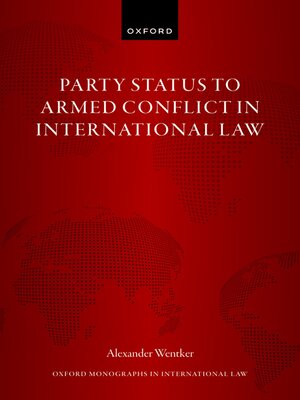Party Status to Armed Conflict in International Law
ebook ∣ Oxford Monographs in International Law
By Alexander Wentker

Sign up to save your library
With an OverDrive account, you can save your favorite libraries for at-a-glance information about availability. Find out more about OverDrive accounts.
Find this title in Libby, the library reading app by OverDrive.



Search for a digital library with this title
Title found at these libraries:
| Library Name | Distance |
|---|---|
| Loading... |
The question of what constitutes an armed conflict has featured prominently in international law debates. However, international lawyers have paid less attention to the inextricable question of who is engaged in a conflict, focusing solely on whether there is an armed conflict. Against this backdrop, Alexander Wentker's Party Status to Armed Conflict in International Law explores why it matters and how it is established that a State, international organization, or armed group is a party to an armed conflict. The first part of the book demonstrates that party status is central at all levels of the international legal regulation of armed conflicts, with parties to armed conflict being both key addressees of international law and central reference points for regulating individuals and third parties. In response to increasingly widespread cooperation practices, the book's second part advances an analytical framework for identifying parties to conflicts with multiple parties on the same side (or 'co-parties'). Party Status to Armed Conflict in International Law is aimed at academics, students, and practitioners seeking to understand how armed conflicts are legally regulated. It presents readers with a refined account of how responsibilities are allocated in armed conflicts, enabling deeper insight into how international law can best respond to the realities of contemporary conflicts.







